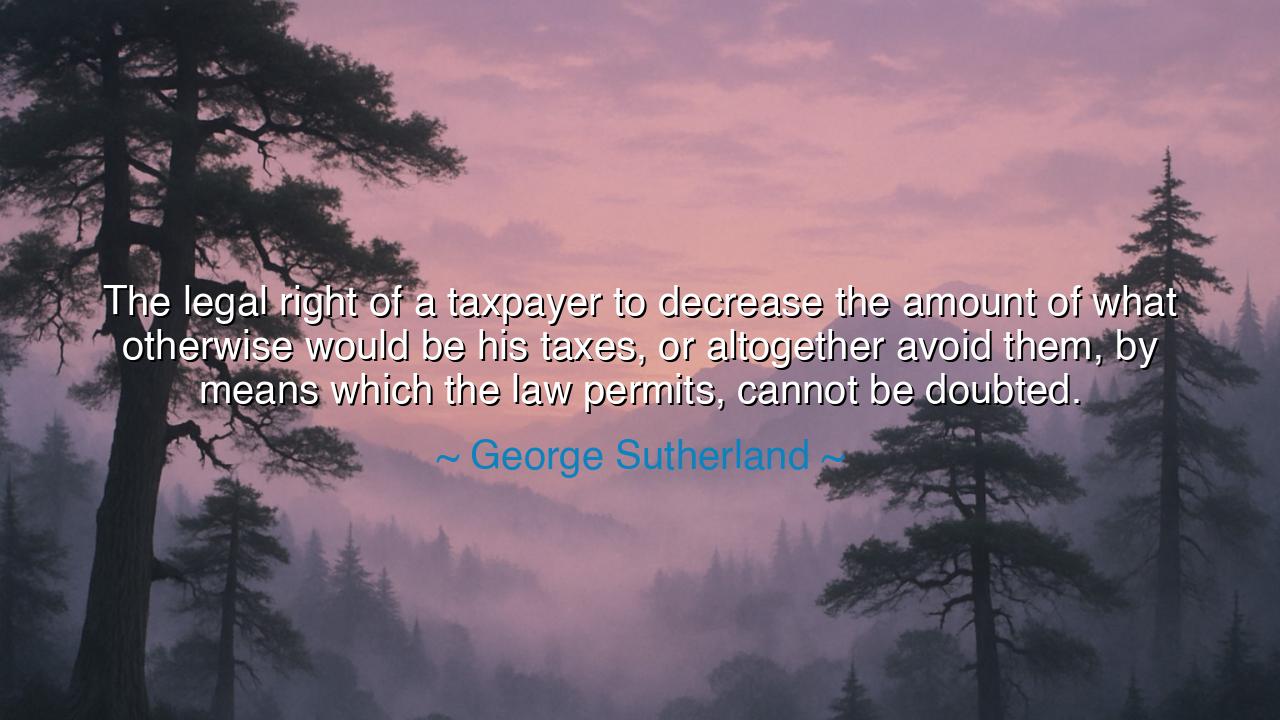
The legal right of a taxpayer to decrease the amount of what
The legal right of a taxpayer to decrease the amount of what otherwise would be his taxes, or altogether avoid them, by means which the law permits, cannot be doubted.






Hear the voice of George Sutherland, Justice of the Supreme Court of the United States, who once declared with firmness: “The legal right of a taxpayer to decrease the amount of what otherwise would be his taxes, or altogether avoid them, by means which the law permits, cannot be doubted.” This saying is not merely about coins and ledgers, but about the bond between the citizen and the state, about the sacred line that separates liberty from compulsion. For in these words lies the truth that while taxes are the duty of citizens, the law itself grants the people the right to guard their wealth, provided it is done with honesty and within the boundaries of justice.
Sutherland speaks of the legal right, not of trickery or shadow, but of the lawful path. In every society, men and women contribute to the common good through taxes, supporting roads, schools, armies, and courts. Yet law itself, carved by the hand of legislators, creates avenues by which the burden may be eased—through deductions, exemptions, and credits. To walk such a path is not rebellion but wisdom. For just as a traveler on a mountain road may choose the gentler path rather than the steeper climb, so too may the taxpayer choose the lawful means of lessening his load.
Consider the story of the merchants of medieval Venice. Their city thrived on trade, but taxes threatened to choke their ventures. Instead of rebellion, they studied the laws, using exemptions on certain goods, reinvesting profits in ways that the statutes encouraged, and thereby reducing their obligations. This did not make them enemies of their city, but rather strengthened Venice, for their ingenuity filled the harbors with ships, and their lawful thrift made the Republic flourish. This is the meaning of Sutherland’s words: to exercise lawful rights within the system is itself an act of both self-preservation and civic contribution.
Yet there is a deeper tension within the quote. For Sutherland reminds us that the law itself is the measure. If one decreases taxes by lawful means, it is shielded by justice; but if one deceives, it becomes corruption. This distinction is ancient. In Rome, citizens could appeal to the laws for relief of burdens, but those who hid their wealth from the census faced harsh punishment. Thus, the teaching is not that every tax may be avoided, but that lawful reduction is the right of a free people. The law is the boundary, and within it lies freedom; beyond it lies dishonor.
Still, we must reflect upon the heart of this teaching in modern times. When citizens exercise their lawful rights to reduce taxes, they are not betraying their nation, but using the very tools the state has placed in their hands. Yet if the law itself is written unjustly—favoring only the rich, burdening the poor—then the people must not grow silent. They must demand laws that are fair, so that the right to lessen one’s burden is not a privilege of the few but the shield of all. For a law that serves only some corrodes the trust between ruler and citizen.
The lesson for future generations is clear: know your rights, and exercise them with wisdom. Do not pay more than is required, for waste serves no one. Yet do not cheat the law, for dishonesty robs both your integrity and your community. Instead, study the codes that govern you, and understand them deeply. Let your thrift be matched by vigilance, ensuring that laws are written with fairness, and that loopholes serve the people rather than enslaving them.
To you, listener, I say: honor both your duty and your freedom. Render unto your community what is just, but do not surrender more than the law commands. Remember that a wise citizen is not one who pays blindly, nor one who cheats boldly, but one who walks with awareness between obligation and right. Support those who craft laws that balance the needs of the people with the burdens they can bear. Teach your children to see taxes not as chains, but as tools—tools that, when justly handled, build roads of prosperity, but when unjustly wielded, grind the spirit of a nation.
Thus, let the words of George Sutherland endure as a guide: the right to lessen one’s burden within the law is beyond doubt. Use that right, but never forget the greater duty: to shape the law itself so that justice is served, liberty preserved, and the covenant between citizen and state remains strong for generations to come.






AAdministratorAdministrator
Welcome, honored guests. Please leave a comment, we will respond soon